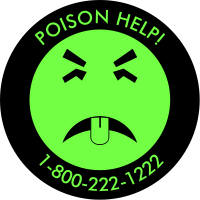Do you remember Mr. Yuk?
Many poison centers used to give parents Mr. Yuk stickers to put on poisonous things. The idea was that kids would learn to stay away from products that had the Mr. Yuk sticker on them. It was a good concept and very popular tool.
However, studies showed that Mr. Yuk wasn’t effective. Parents couldn’t realistically put stickers on every possible poison, so even if their child was really well trained to stay away from things with the sticker, they might think it was OK to play with products that didn’t have it. Some kids may have been attracted to the sticker, too.
Maybe more importantly, the kids targeted with the campaign—young school-aged kids—are not the real high-risk group. Children ages 13 months to 2 years are the most at risk for poisoning. In fact, they accounted for nearly 25% of all poisoning calls to the NNEPC in 2012.
Given all of this, most poison centers phased out using Mr. Yuk over a decade ago.
The sticker also couldn’t always help for medication. Medication is the most common cause of poisoning among young children, and they frequently get loose pills that have fallen to the floor. A study released this year by Safe Kids Worldwide found that among children treated for medication-related poisonings in an emergency room in 2011, 27% had found the medicine on the ground or misplaced. The next most common places they found medication were in a purse, bag or wallet (20%), on a counter, dresser, table or nightstand (20%), and in a bag of pills or pillbox (15%). The medications most often belonged to a grandparent (38%).
This report is a reminder to keep all medications in child-resistant packaging and out of the reach of children, and to be careful to not leave loose pills lying around. And programming your cell phone with the poison center phone number, 1-800-222-1222, is the best way to be prepared in case a child does get into some medication.





